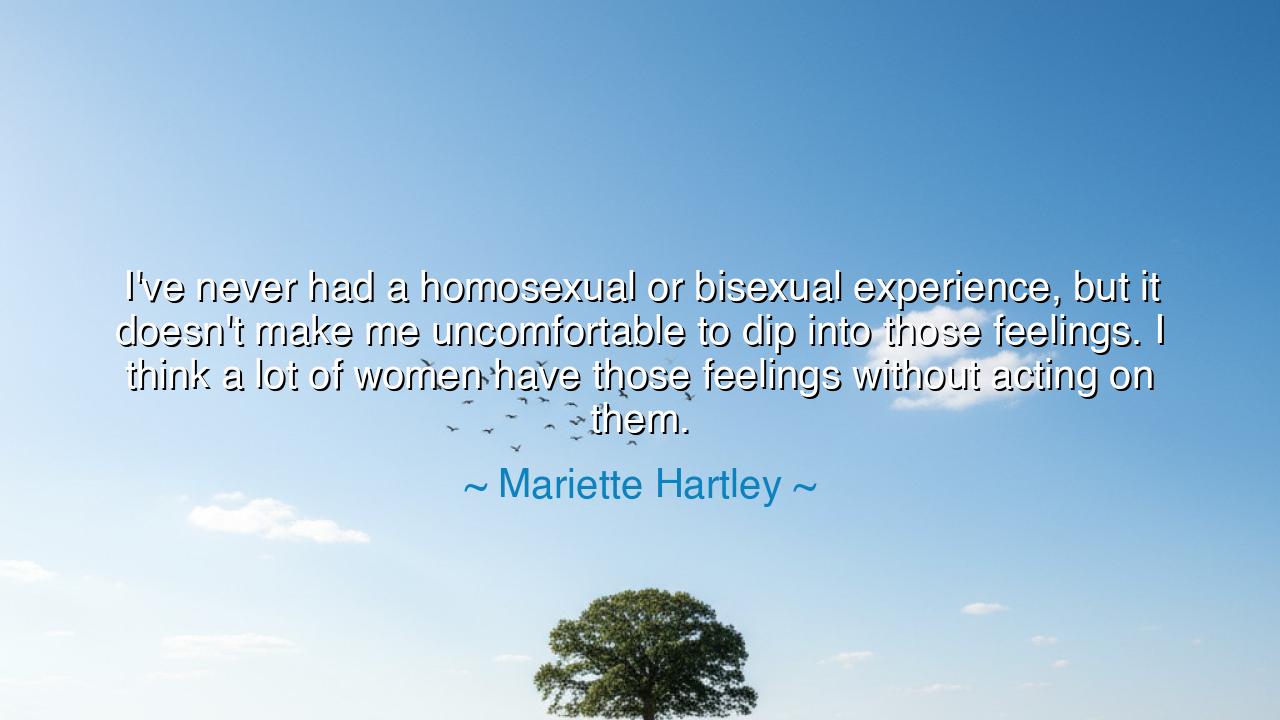
I've never had a homosexual or bisexual experience, but it
I've never had a homosexual or bisexual experience, but it doesn't make me uncomfortable to dip into those feelings. I think a lot of women have those feelings without acting on them.






Host: The room was quiet, the soft hum of the world outside barely reaching through the window. Jack sat with his hands clasped together, his eyes focused on something in the distance, clearly reflecting on something he had just read. Jeeny, who had been reading nearby, noticed his thoughtful pause and set her book down, sensing that he was lost in a deeper thought.
Jeeny: “You seem like you’re processing something. What’s on your mind?”
Jack: “I came across a quote from Mariette Hartley today. She said, ‘I’ve never had a homosexual or bisexual experience, but it doesn’t make me uncomfortable to dip into those feelings. I think a lot of women have those feelings without acting on them.’ It made me think about how complex sexuality is, and how people often feel these feelings without fully understanding them, or even knowing what to do with them.”
Jeeny: “That’s a really interesting perspective. It speaks to the complexity of sexuality—how people can experience feelings that don’t necessarily fit into a specific label or identity. I think a lot of times, we put so much pressure on ourselves to define or act on every feeling we have, when sometimes, it’s okay to just acknowledge those feelings without needing to categorize them.”
Jack: “Exactly. It’s like she’s acknowledging that feelings of attraction or curiosity can exist without necessarily needing to turn them into an identity or act on them. Sexuality is a spectrum, and it’s normal for people to feel things that don’t neatly fit into one category. The quote made me think about how we often overcomplicate these feelings, trying to define them or make them mean something specific when they can just be part of our human experience.”
Jeeny: “Right. There’s a freedom in understanding that you don’t have to act on every feeling you experience, and you don’t need to label those feelings to give them validity. Sometimes, feelings are just feelings, and there’s no need to try and force them into a box. It’s about allowing yourself to experience emotions and attractions without judgment.”
Jack: “It also touches on the idea that identity doesn’t always have to be fixed. We often feel like we need to choose sides, but fluidity in feelings, especially sexual ones, can be part of who we are. It’s okay to explore these feelings, even if they don’t define us in a particular way.”
Jeeny: “Exactly. And there’s something powerful in the acceptance of that fluidity. The idea that you don’t have to act on something to accept it or acknowledge it as part of your experience is really freeing. It’s about being open to the full range of human emotions and experiences, without forcing yourself into a predefined mold.”
Jack: “And I think it’s also about comfort with the unknown. Sometimes, we’re taught to resist feelings that we don’t fully understand, but maybe what Mariette Hartley is saying is that it’s okay to sit with those feelings without needing to make them something specific.”
Jeeny: “Yes, self-acceptance is key. It’s about not feeling the need to justify or explain every aspect of our feelings. You don’t need to act on them to validate them—they can just exist. It’s a reminder that we don’t have to have everything figured out. We can simply experience without pressure.”
Host: The room felt quieter now, filled with a sense of understanding. Jack and Jeeny sat in a moment of reflection, realizing that sexuality—and all the feelings that come with it—doesn’t have to be confined to clear labels. It could be fluid, unspoken, and simply part of being human. And in accepting those complexities, they both felt a little more at ease with the idea that not everything needed to be defined.






AAdministratorAdministrator
Welcome, honored guests. Please leave a comment, we will respond soon